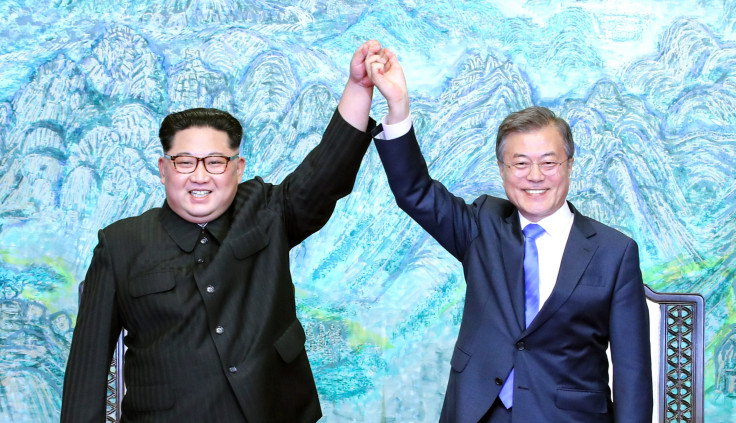North Korea Military May No Longer Be Called South Korea's 'Enemy': Official

Multiple South Korean governmental officials confirmed Wednesday they were considering deleting their reference to North Korea's military as "our enemy" from the defense white paper to be published later this year.
The move, if taken, will be in tandem with the agreement reached during the inter-Korean summit in April between the leaders of the North and South to stop "all hostile acts" against each other’s lands in order to “practically eliminate the danger of war” and aim for a peaceful reconciliation of the Korea peninsula.
"It would be contradictory if we hold consultations (with the North) over measures to halt hostile acts, which are mentioned in the Panmunjom Declaration, while leaving the description of the North Korean military as an enemy in our government's official paper," an anonymous government source told Yonhap News Agency.
However, they seemed to have hit a bit of a snag.
"We have been striving to come up with a way to use a phrase or word that would sufficiently reflect the North's military threat instead of using the 'enemy' expression," the source added.
Referring to North Korean military as the “enemy” in their defense paper is something the South initiated in 1995 — a tradition that was carried out even last year.
“The North's weapons of mass destruction, such as nuclear weapons and missiles, cyber-attacks and terrorism threats pose a big threat to our security. ... As long as these threats continue, the North Korean regime and its military are our enemies,” South Korean 2016 defense white paper stated.
However, the term “enemy” has had its fair share of variations over the years, as the relations between the North and the South fluctuated from extremely violent to amicable and back again.
For example, after a Pyongyang official threatened to turn Seoul into a "sea of flames” in 1995, the term “enemy” was coined when referring to North Korea in South’s defense paper. But, the expression was avoided in 2004’s paper, as it was supplemented it with the phrase "direct military threat" as a conciliatory attitude persisted.
South Korea was back to calling the northern regime its “enemy” in 2010, after multiple military attacks launched by Pyongyang against Seoul, which included torpedoing the South’s corvette Cheonan in March of that year, claiming the lives of 46 sailors, and launching an artillery attack on the island of Yeonpyong, which killed two soldiers and two civilians.
However, starting 2018, the relation between the two Korean halves have showed signs of thawing. In January, North Korean leader Kim Jong Un reopened a border hotline with the South that had been closed for almost two years.
And following the summit between Kim and South Korean President Moon Jae-in, the latter has supported North’s demand the United States declare a formal end to the Korean War – something that Washington has refused to do till Pyongyang agrees to “complete denuclearization of the Korean Peninsula.”
Kim and Moon are scheduled to meet next month for their third summit.
© Copyright IBTimes 2025. All rights reserved.






















